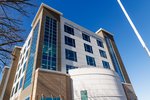
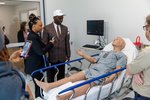
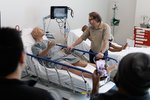
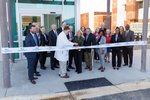


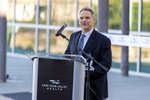

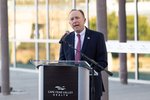
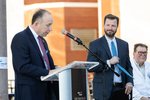
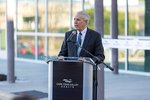
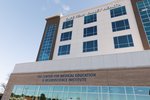
From doctors to donors, about 100 people gathered Friday for the ribbon-cutting of the Center for Medical Education & Neuroscience Institute, which took more than 10 years to conceptualize, 18 months to build and $33 million in donations and community effort to see to fruition.
Staff members and volunteers worked to showcase the facility after the ceremony with tours of the new offices, training rooms with human simulators and an entire floor dedicated to neuroscience.
Michael Nagowski, CEO of Cape Fear Valley Health, said there are three overall benefits of the new facility.
“First and foremost, this will address the workforce shortage very specifically here in southeastern North Carolina,” Nagowski said. “This program is designed to help resolve that situation. And the proof is in the pudding, because we have already retained 50% of our graduates who have decided to stay and care for our community.”
The second benefit is the economic impact it will have on the community, he said.
“This is a tremendous economic generator. This program in just its first 10 years of existence is estimated to generate almost $600 million in economic activity,” said Nagowski.
The last benefit is improved health outcomes.
“The data is clear: Wherever you have a robust physician residency program, the population’s health improves. It is just the way it works.”
Watch a Facebook Live video of Friday's ribbon-cutting here.
Nagowski credited Campbell University for its vision and perseverance; volunteers; and those who raised money to help make the building a reality, especially through Cape Fear Valley Health Foundation.
Sabrina Brooks, vice president of the foundation, said the project required years of work.
“This all started about 15 years ago when we recognized that there was a growing need for neurological care in our community. And about 10 years ago, we realized that Campbell University would need places for their graduates from their new medical school to train,” Brooks said. “From those conversations, our foundation put together the Caring for the Future campaign, which focused on cultivating a new generation of physicians. When we went to the community to ask for support, the result was almost $8 million.”
The five-story, 120,000-square-foot building cost a total of about $33 million.
Your support helps ensure a more informed community. Donate today.
According to Ryal Aul, president of the foundation’s board, the fundraising came together when people recognized the importance of training much-needed physicians.
“The Cape Fear Valley Health Foundation mission is straightforward. When there is a hospital project that promotes a stronger, healthier community, we are there to fundraise,” said Aul.
Brooks agreed and said dedicated people saw the benefit of improving the local health system.
“This community recognizes the importance of exceptional health care, and they are willing to invest their philanthropic dollars in making sure our community has high-quality health care for all of our citizens,” Brooks said.
Another $15 million was secured by the Cumberland County legislative delegation last year. Lawmakers involved included state Rep. Diane Wheatley, former Rep. Billy Richardson, former Sen. Kirk deViere, and former Rep. John Szoka.
All four attended Friday’s ribbon-cutting.
“There is no lack of visionary projects that will make a difference in local communities up in Raleigh, so you have to fight for what you believe in. It was in our best interest for our community. This is a great hospital and a great vision,” said Szoka.
Wheatley said that the training opportunities the facility will provide and the residency program that will help retain physicians are advantages for the community.
Dr. Don Maharty, vice president of medical education at Cape Fear Valley Health, said the hospital offers 15 programs for more than 300 residency seats. B 2030, 20 to 25 such programs can be offered, he added.
“People have given. People have sacrificed. Hopefully, that is going to plant the seed that will germinate into a very large oak to change the future of health care here in Fayetteville,” said Maharty.
Another aspect of the building is that its design will encourage collaboration because all the program directors are together on one floor.
“Collaboration in health care is important. Health care is not a solo game. It is a team game,” Nagowski said. “The diseases and the issues that people face are complex, and they're often beyond the scope of just one individual physician. We needed to translate that into the training.”
Nagowski said the comprehensive approach is the future of health care.
“It’s remarkable when you think about it. If you are a carpenter, everything can be solved with a hammer. If you are a plumber, everything can be solved with a wrench. But the magic happens when you work together. You can build a house. It’s the same in health care. It’s really something,” said Nagowski.
“The second floor is where the program directors have offices, and there are training rooms that can house all of the different physician specialties in one room for lectures and collaboration,” he added.
Dr. Scott Klenzak, director of the psychiatry residency program, agreed that having all program directors on one floor, instead of in locations throughout the campus, is important for the partnership that the physicians need to have to improve health outcomes.
“We are all together now, and this building will be the central hub. There is so much that goes on behind the scenes to run a residency program — recruiting, planning. This collaboration is valuable.”
Robert Van Goens, president and CEO of the Fayetteville-Cumberland County Economic Development Corp., said the investment will have lasting impact.
“I think that when you're looking at the impact this facility will have on health outcomes and the importance of what it will do to continue to grow local doctors and then keep them here, the investment that has been made will have an exponential return benefiting the community,” said Van Goens.
It is also an investment that Nagowski said will bring even more physicians to the hospital.
“We have 300 physicians training daily in our residency program. Over the next 10 years, I think that number will grow to over 600 physicians,” said Nagowski.
Amid a national doctor shortage and with the busiest emergency room in North Carolina, Nagowski said, the new building and the concepts within are a giant leap in the right direction.